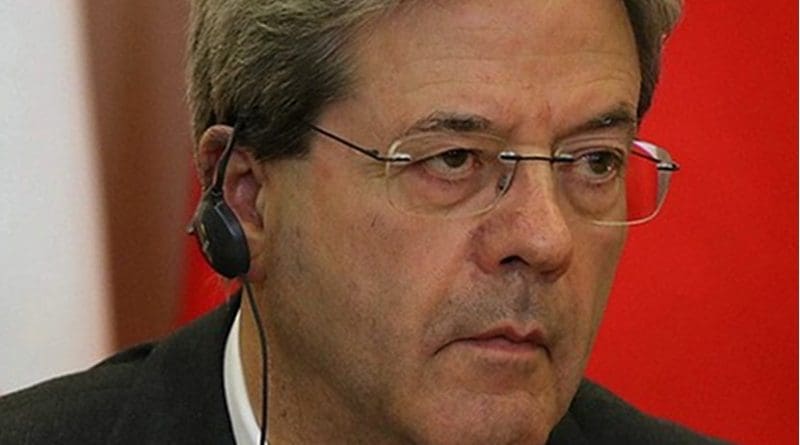Italy: Election Expected To Produce Hung Parliament
By EurActiv
By Georgi Gotev
(EurActiv) — Italy will vote on March 4 in an election expected to produce a hung parliament, instability and possible market turbulence in the eurozone’s third largest economy.
Prime Minister Paolo Gentiloni’s cabinet set the date of the vote after the president dissolved parliament on 28 December, formally opening an election campaign which in practice has already been raging bitterly for weeks.
With opinion polls suggesting no one will win a parliamentary majority, Gentiloni said he would remain in office and ensure continuity until a new administration was in place.
As things stand, a centre-right alliance around Silvio Berlusconi’s Forza Italia (Go Italy) looks set to take the largest number of seats – potentially catapulting the 81-year-old four-times premier back to centre stage, even though he cannot become prime minister due to a tax fraud conviction.
Gentiloni told reporters at the end of his one-year spell in power that Italy should not fear uncertainty, noting that it was now common to many European countries.
“We mustn’t dramatise the risk of instability, we are quite inoculated against it,” he said, in reference to Italy’s frequent changes of government, adding that elsewhere in Europe there has been “an Italianisation of political systems”.
Germany is locked in talks to produce a new government after inconclusive elections, while Spain and Portugal have minority governments and Britain is in tangled negotiations over its exit from the European Union.
However, Italy, with the largest public debt in the euro zone after Greece’s and one of the bloc’s highest jobless rates, is considered particularly vulnerable.
Its economy is on course this year for its firmest growth since 2010, but it remains among the most sluggish performers in Europe as it has been since the start of monetary union in 1999.
Revolving doors
Gentiloni is the third prime minister since the last election in 2013, which also produced no clear winner. His predecessor, Matteo Renzi, quit in December 2016 after voters threw out his planned constitutional reforms in a referendum.
Speaking last week, at the prime minister’s traditional year-end news conference, Gentiloni appealed to parties not to peddle fear and make unrealistic promises.
All the main political forces are pledging to raise the budget deficit and slash taxes despite record high public debt, and immigration is set to be a central theme of the campaign, with right-wing parties frequently warning of a migrant “invasion”.
The anti-establishment 5-Star Movement leads opinion polls with about 28% of the vote, followed by the ruling Democratic Party (PD), of which Gentiloni is a member, on around 23%.
However, most seats in parliament are seen going to a conservative alliance, with Berlusconi’s Forza Italia on around 16% and the right-wing Northern League and Brothers of Italy on 13 and 5% respectively.
The PD’s support has been falling, hurt by banking scandals involving Matteo Renzi and internal splits. There has been speculation that Gentiloni may take over from its leader Renzi as its candidate for prime minister at the election.
The PD is also weakened by the surge of new political forces, such as +Europa of former European Commissioner Emma Bonino, a former Radical, who said she will run for elections separately from PD.
Gentiloni, whose popularity ratings are higher than Renzi’s, refused to be drawn on this, but advised the PD to reject populism and run a sober campaign as “a tranquil party of government”.
“This is the message the PD has to give, and if it does so I think it will regain support,” he said.
Although the presidency is usually a mainly ceremonial role, President Sergio Mattarella is likely to become a central figure if the election produces no clear winner.
He is expected to ask the centre right to try to form a government if, as expected it is the largest coalition. But if it cannot muster a majority then the second chance may fall to the maverick 5-Star if it is still the largest party.
Its leader Luigi Di Maio said on Thursday he would work for a policy deal with other parties after the election, shifting away from the movement’s previous refusal to form alliances.
On 31 December, Mattarella urged political parties to make realistic proposals to tackle Italy’s problems, especially joblessness, ahead the election.
“The duty to make adequate proposals – realistic and concrete ones – is a must given the dimension of the problems our country faces,” Mattarella said during a traditional end-year speech broadcast live on national television.
“Yet again I must underscore that jobs remain the primary and most serious social issue, especially for the young,” he added in his unusually brief 10-minute address.
Italy’s economy, the euro zone’s third-biggest, probably grew this year at its fastest rate since 2010, but remains among the most sluggish in Europe. Unemployment remains above 11%, while youth joblessness is about 35%.
Though Italy has the largest public debt in the euro zone after Greece’s, all the main political forces are pledging to raise the budget deficit if they win the election, with policies ranging from the expansive to the outlandish.
Unconventional proposals
PD is promising up to €50 billion in tax cuts, Forza Italia wants to bring back the lira for domestic use alongside the euro and introduce a flat income tax.
The anti-establishment 5-Star Movement has floated the idea of holding a referendum on Italy’s euro membership if the European Union refuses to renegotiate its stringent fiscal rules.

